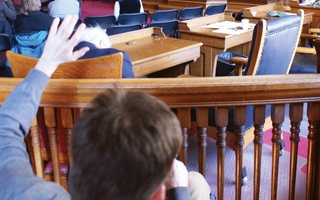Over 60 Cambridge residents met for the second session of the Climate Emergency Congress on Saturday to vote on a list of recommendations responding to the city’s climate challenges. Four hours and 52 minutes later, the delegates came to the consensus to reconvene for a third session.
The community members originally hoped to pass two proposals that had been prepared by a 13-member committee following the Dec. 12 session—the first recent city-wide discussion on how residents and local businesses can adopt more environmentally friendly practices.
The attendees, who received drafts of the proposals the day before, voiced concerns about what they characterized as a rushed process and quibbled over details throughout the meeting. A third session, they argued, would allow time for revisions and closer scrutiny of the document.
Once the group decided to postpone finalizing recommendations that they plan to later send to the City Council, the delegates decided to hold unofficial votes on the proposals.
The first proposal focused on broader tasks, such as tracking the city’s annual progress and ensuring that changes meet community needs. The proposal was generally met with acceptance, with 47 delegates voting in support and 12 opposed.
The second proposal contained a more specific list of actions, including the creation of a Climate Emergency Response Board to coordinate city action and change Cambridge’s green infrastructure. After some modification, the measure also met widespread approval, with 40 votes in favor and 11 opposed.
Earlier in the day, the delegates split up into small groups to hone in on key recommendations from the December session. The delegates were then divided into action-specific groups—focusing on areas such as energy waste, solar power, forestry, and accounting methods—to brainstorm further steps Cambridge residents could take.
City Council member Henrietta J. Davis summarized the city’s environmental goals for the future as a three-tiered process, starting with citywide advocacy, community group work, and individual responsibility.
Davis also reminded the delegates of the financial constraints that may limit extensive environmental projects.
“It’s not a great time of huge new money to do things,” Davis said, listing the $3.9 million shortfall in the school budget as an example. “It doesn’t mean you can’t reallocate, but money isn’t growing on trees right now.”
In her closing words, former Cambridge Mayor E. Denise Simmons concluded that more important to effecting a change quickly was the power of working together.
“The Congress has also demonstrated that there are important things we can do working together as a city-wide community at all levels,” Simmons said. “This is a lesson I hope we can take from the Congress—that it’s not just going to take one of us, it takes all of us.”
—Staff writer Xi Yu can be reached at xyu@college.harvard.edu.
This article has been revised to reflect the following correction:
CORRECTION: January 26, 2010
An earlier version of the Jan. 25 news article "Citizens Debate Climate Plans" called E. Denise Simmons the mayor of Cambridge. In fact, Simmons is no longer the city's mayor. She is a Cambridge city council member.
Read more in News
Harvard Relief Team Returns From HaitiRecommended Articles
-
Tsongas Predicts Kennedy Will RunWASHINGTON--Sen. Paul E. Tsongas (D-Mass.) said yesterday he won't stand in for Sen. Edward M. Kennedy '54 (D-Mass.) because he
-
Fact and Rumor.There was a cut in History 5 yesterday. A Shooting Club dinner is soon to take place. Mr. R. T.
-
 Climate Congress Has Three New Proposals
Climate Congress Has Three New Proposals -
Middle Eastern CEOs Discuss ChallengesA panel of three Middle Eastern CEOs discussed the opportunities and challenges of doing business in the Middle East at the Kennedy School last night before dozens of entrepreneurs from the Arab world as part of a week-long AllWorld Summit.
-
Delegate CountingWith no defining narrative emerging out of Tuesday’s Republican debate, the time is long past to start looking long and hard at the delegate math of this year’s primary.
-
Grad Student Council Election Draws Large Voter TurnoutAt the end of one of the longest and most contentious elections in recent memory, current President Cammi N. Valdez, along with a slate of other incumbent candidates, maintained control of five of the six contested positions on the Council.













